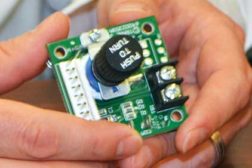Home » building controls
Articles Tagged with ''building controls''
Market Growth Will Be Limited by Global Economic Recovery
Read More
May 5, 2014: Networked Building Controls to Reach $34.7 Billion in Revenue by 2021
Web-Based Dashboards and IP-Enabled Devices Are Key Market Enablers, Report Finds
May 5, 2014
Avionics Mil-Spec Part Solves Commercial HVAC Temperature Stability Problem
Part Maintains Setting and Avoids Repeat Service Calls
April 21, 2014
April 18, 2014: Reliant and EnTouch Offer Energy Management to Texas Businesses
Small- and Medium-Sized Companies Can Schedule and Control HVAC
April 18, 2014
April 16, 2014: ABB and Philips Join Forces in Commercial Building Automation
ABB Building Automation Will Connect Seamlessly with Philips Lighting Systems
April 16, 2014
March 31, 2014: Building Automation Projects Moving Toward Convergence onto a Common Platform
Almost Half of Today’s Projects Involve Multiple Legacy Control Protocols That Don’t Interoperate
March 31, 2014
March 28, 2014: Building Automation Systems Are Being Transformed by Digital Technology
Building Automation Has Reached a Tipping Point
March 28, 2014
Johnson Controls Honors Memphis Wholesale Distributor
Company Earned Recognition with a 23 Percent Increase in Annual Global Sales
March 10, 2014
March 4, 2014: Shipments of Smart Building Networking Devices Expanding, Says Report
Building Owners and Operators Are Realizing the Cost Savings Offered by Automated, Real-Time Control
March 4, 2014
Feb. 14, 2014: Honeywell Recipient of Four Control Trends Awards
Awards Honor Top Performers in the HVAC, Controls, and Building Automation Industries
February 14, 2014
Copyright ©2024. All Rights Reserved BNP Media.
Design, CMS, Hosting & Web Development :: ePublishing


